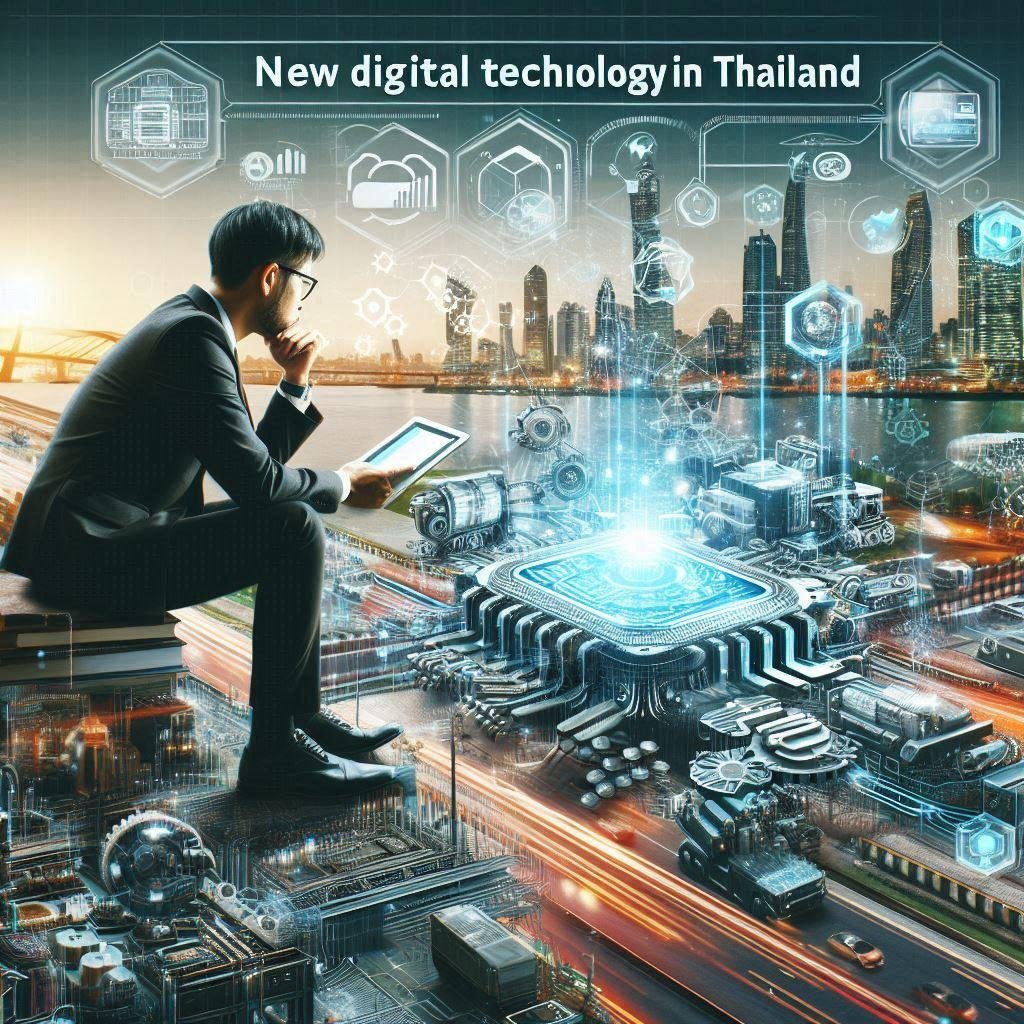Thailand has rapidly evolved into a hotspot for digital technology, reflecting its dynamic economy and forward-thinking mindset. As the nation embraces the digital age, a range of new technologies are making waves, revolutionizing industries, and enhancing everyday life. This blog will show you about the new digital technology in Thailand provides a deep dive into the latest digital technologies emerging in Thailand, highlighting their impact and potential.
The Rise of Digital Innovation in Thailand
Thailand’s Digital Transformation Journey
Over the past decade, Thailand has witnessed a remarkable digital transformation. The government’s Thailand 4.0 initiative aims to drive economic growth through digital innovation, focusing on the development of smart industries and infrastructure. This vision has spurred significant investments in digital technology, making Thailand a key player in Southeast Asia’s tech landscape. By fostering a conducive environment for technological advancements, the country has attracted both local and international tech companies, further accelerating its digital journey.
Key Digital Technologies Shaping Thailand
1. 5G Technology
5G technology is a game-changer for Thailand, promising faster internet speeds, lower latency, and the ability to connect a vast number of devices simultaneously. This next-generation network is set to transform various sectors, from healthcare to transportation. In Thailand, major telecom operators have begun rolling out 5G networks across urban areas, paving the way for advancements like smart cities and autonomous vehicles. The enhanced connectivity provided by 5G is expected to drive innovations in areas such as remote work, telemedicine, and smart infrastructure.
2. Artificial Intelligence (AI)
Artificial Intelligence is making a significant impact in Thailand, with applications ranging from customer service to healthcare. AI-powered chatbots are becoming common in businesses, offering 24/7 support and enhancing user experience. In healthcare, AI is being used for diagnostics and personalized treatment plans, improving patient outcomes and operational efficiency. By leveraging AI, Thai companies are able to streamline processes, reduce costs, and deliver more personalized services to their customers.
3. Blockchain Technology
Block-chain technology is gaining traction in Thailand, particularly in the financial sector. The technology’s ability to provide secure, transparent, and tamper-proof transactions makes it ideal for applications like digital currencies and supply chain management. Thailand’s Bank of Thailand is exploring block-chain for its digital currency project, aiming to streamline payments and reduce fraud. The adoption of block-chain is expected to enhance trust and efficiency in financial transactions, contributing to the growth of a robust digital economy.
4. Internet of Things (IoT)
The Internet of Things (IoT) is transforming various industries in Thailand by connecting devices and systems to collect and analyze data. Smart home technology is becoming increasingly popular, with IoT-enabled devices offering enhanced convenience and energy efficiency. Additionally, IoT is revolutionizing agriculture with precision farming techniques that optimize resource use and boost crop yields. These advancements are helping farmers improve productivity and reduce operational costs.
5. Augmented Reality (AR) and Virtual Reality (VR)
Augmented Reality (AR) and Virtual Reality (VR) technologies are gaining momentum in Thailand’s entertainment and education sectors. AR is being used to create interactive experiences in retail and tourism, while VR is revolutionizing training and simulation. These technologies offer immersive experiences that engage users and provide practical benefits. For example, AR applications in tourism enhance visitor experiences by overlaying digital information on physical landmarks, while VR simulations are used for hands-on training in various industries.
The Impact of Digital Technologies on Thai Society
Economic Growth and Job Creation
The adoption of digital technologies in Thailand is driving economic growth and creating new job opportunities. The tech industry is rapidly expanding, offering roles in software development, data analysis, and cybersecurity. Additionally, digital technologies are fostering innovation in traditional industries, enhancing productivity and competitiveness. The growth of the tech sector is attracting investments from both local and international companies, contributing to the overall economic development of the country.
Improved Quality of Life
Digital technologies are improving the quality of life for many Thais. With advancements in healthcare technology, individuals have access to better medical services and information. Smart city initiatives are enhancing urban living by improving transportation, energy management, and public safety. Moreover, e-commerce and digital payment systems are making transactions more convenient and accessible. The integration of digital solutions into everyday life is contributing to a more connected and efficient society.
Challenges and Opportunities
Addressing Digital Divide
While digital technologies offer numerous benefits, there are challenges to address, such as the digital divide. Ensuring that all regions, including rural areas, have access to digital infrastructure is essential for inclusive growth. The government and private sector are working together to bridge this gap and promote digital literacy. Initiatives such as expanding broadband coverage and providing affordable internet access are crucial in addressing disparities and ensuring that everyone can participate in the digital economy.
Data Security and Privacy
As digital technologies advance, so do concerns about data security and privacy. Ensuring robust cybersecurity measures and protecting personal information are critical for maintaining public trust. Thailand is investing in cybersecurity initiatives and regulations to safeguard its digital landscape. The implementation of data protection laws and the establishment of cybersecurity frameworks are essential for mitigating risks and ensuring the security of digital transactions and communications.
Conclusion
Thailand is at the forefront of digital technology adoption, with advancements in 5G, AI, blockchain, IoT, AR, and VR shaping its future. These technologies are driving economic growth, improving quality of life, and transforming various sectors. While challenges exist, such as bridging the digital divide and ensuring data security, the opportunities for innovation and development are immense. As Thailand continues its digital journey, it stands poised to become a leader in the global tech arena.






Nice Article
}
You may be able to secure larger loans and enjoy lower monthly repayments by taking out a loan secured on your property. Find the best current offers today.
If you’re a property owner looking to borrow money, a secured loan could be a sensible option. Leverage better rates by using your home as collateral.
Release the equity in your property with a secure home equity loan — suitable for funding home improvements, large expenses, or debt consolidation.
Thinking about a loan against your home to consolidate your financial obligations? Find out more and check what options may be available to you.
If you’re a homeowner looking to borrow money, a secured loan could be a wise option. Leverage better rates by using your home as collateral.
Discover how a secured loan can help you access the money you need without parting with your home. Review lenders and tailor a plan that fits your needs.
Equity release solutions may provide the financial freedom you’ve been looking for. Learn how to tap into the equity tied up in your home without having to move.
Uncertain whether a secured loan is right for you? Understand the benefits, such as lower interest rates and larger borrowing amounts.
Such a beneficial bit of content.
I found new insight from this.
I absolutely valued the way this was presented.
Such a informative insight.
I truly admired the way this was laid out.
I gained useful knowledge from this.
The detail in this write-up is noteworthy.
I’ll definitely recommend this.
The breadth in this write-up is noteworthy.
More articles like this would make the online space a better place.
Such a valuable bit of content.
More content pieces like this would make the online space richer.
I’ll surely return to read more.
The depth in this write-up is noteworthy.
This submission is brilliant.
Thanks for putting this up. It’s a solid effort.
This write-up is valuable.
You’ve evidently spent time crafting this.
The clarity in this article is noteworthy.
This is the kind of writing I find helpful.
Such a practical resource.
This is the kind of writing I look for.
I’ll definitely be back for more.
Thanks for sharing. It’s well done.
I gained useful knowledge from this.
This write-up is impressive.
I’ll surely return to read more.
More content pieces like this would make the online space more useful.
This post is fantastic.
More posts like this would make the internet richer.
Thanks for posting. It’s well done.
This submission is outstanding.
I truly admired the approach this was written.
Such a valuable bit of content.
Such a practical insight.
More blogs like this would make the web more useful.
This write-up is excellent.
You’ve evidently spent time crafting this.
I’ll surely recommend this.
More blogs like this would make the online space better.
The breadth in this piece is noteworthy.
I took away a great deal from this.
I’ll certainly be back for more.
I learned a lot from this.
This post is top-notch.
More articles like this would make the web richer.
This article is amazing.
This article is valuable.
This article is impressive.
Such a valuable bit of content.
Этот обзорный материал предоставляет информационно насыщенные данные, касающиеся актуальных тем. Мы стремимся сделать информацию доступной и структурированной, чтобы читатели могли легко ориентироваться в наших выводах. Познайте новое с нашим обзором!
Получить дополнительную информацию – https://nakroklinikatest.ru/
Thanks for sharing. It’s brilliant work.
I particularly liked the way this was written.
This submission is incredible.
Such a beneficial resource.
The clarity in this content is commendable.
I particularly liked the way this was written.
The depth in this piece is remarkable.
More blogs like this would make the web richer.
More posts like this would make the blogosphere better.
More content pieces like this would make the blogosphere more useful.
I’ll definitely return to read more.
I found new insight from this.
Строительный сайт https://vitamax.dp.ua с полезными материалами о ремонте, дизайне и современных технологиях. Обзоры стройматериалов, инструкции по монтажу, проекты домов и советы экспертов.